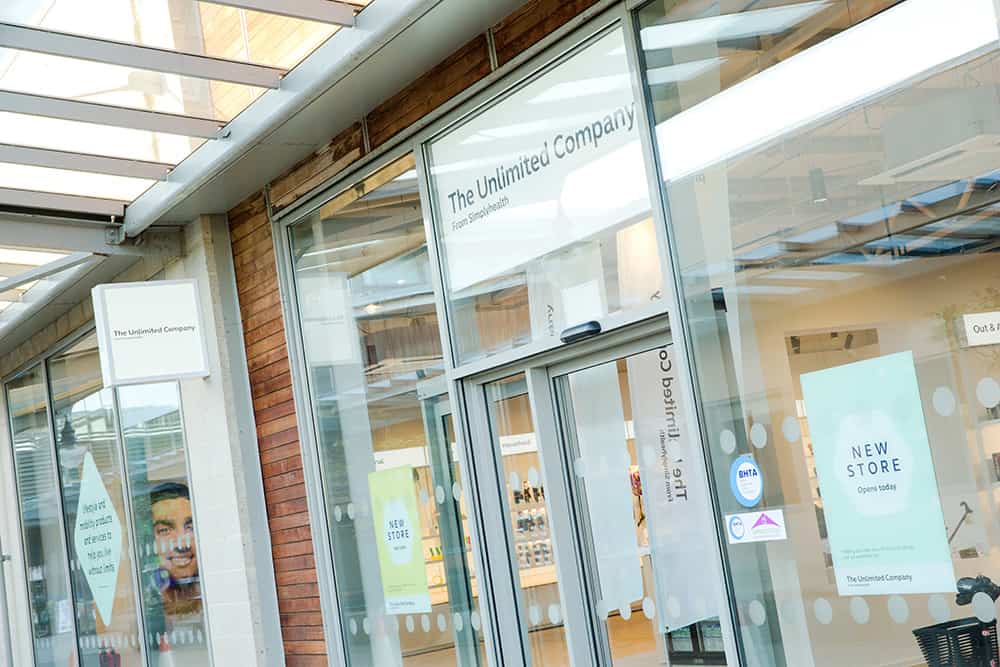A multi-million exit from mobility retail
In October 2017, Simplyhealth took the decision to close down its retail proposition, immediately closing the doors of its retail brand The Unlimited Company. In the months that followed, the company went on to close its remaining retail stores in a move that surprised the industry. In its annual report published for 2017, the organisation has revealed just how much exiting the retail sector cost.
Getting out of retail
Having been operating in mobility retail since 2005 under its own wholly-owned subsidiary, Totally Active Limited, Simplyhealth rebranded its retail proposition into The Unlimited Company in March 2016.
Describing the new brand as bringing a unique, modern approach to mobility retail, Simplyhealth reopened a total of seven stores across the UK under The Unlimited Company moniker over the 16-month period that followed.
On the 17th of October 2017 however, following a review of current and expected trading performance, the board of directors took the decision to shut down its new retail brand, leading to the closure of 10 stores.
At the time of the closures, Romana Abdin, Chief Executive of Simplyhealth, commented in a statement: “Unfortunately, it has become clear that physical shops are not a viable way forward for Simplyhealth and from a business viewpoint, we have to ensure we look at better ways of providing people with the support they need.”
On the 24th November 2017, the directors closed the remaining five retail stores operated by Totally Active Limited, operating under the Care and Mobility banner and continued to trade online until cessation of trade in February 2018.
The full exit cost
According to Simplyhealth’s annual report for 2017, the total cost of exiting the retail business was £5.2 million, with a cost of £1.2 million to cover the redundancy of staff.
The closure of the retail business affected over 80 employees from more than 10 retail outlets across the UK.
“Large mainstream retailers are now providing mobility products and daily living aids, and customers are purchasing these products in new ways, different from the model that we had developed.” Ben Kent
The largest cost associated with the closures however were lease provisions at a cost of £2 million, as well as impairment of goodwill, tangible & intangible assets equally a combined total £1.5 million.
Additionally, £400,000 was attributed to a reduction in stock to net realisable value.
The changing retail healthcare landscape
Discussing the shift in the marketplace, Ben Kent, Chief Financial Officer at Simplyhealth, wrote in the report: “At the end of 2017 we made the difficult decision to close The Unlimited Company, because although we still saw a need to support customers to maintain their independence, the retail landscape had changed.
“Large mainstream retailers are now providing mobility products and daily living aids, and customers are purchasing these products in new ways, different from the model that we had developed.”
Reinforcing this point, Raman Sankaran, Chief Commercial Officer told THIIS back in October that the entrance of larger, national players in the marketplace such as Argos, Amazon and Lloyds Pharmacy had caused the company to review its future in the industry.
“For those consumers looking for an effective route to get what they need, both in terms of cost and delivery, the large general and online retailers have invested a lot of money in making sure they have the best infrastructure to be able to supply that and do that very well,” explained Raman in October 2017.
“There is also a place in the market for the smaller, dedicated mobility stores that operate on a more local level. However, I also believe that there is a growing unmet need for professional guidance and advice, as well as information and education on what is available to ensure that you, your loved ones or patients have the best solutions.”
With high street mainstays in different sectors such as Toys’R’Us, Maplin, Debenhams and House of Fraser folding or struggling, Simplyhealth’s exit from mobility retail emphasises the importance of having the right proposition to effectively service customers whilst remaining competitive.
Emphasising this point, Raman noted that Simplyhealth would continue to keep an eye on the market: “We didn’t have our proposition quite right for the current market but we will continue to explore how we can add value in this area.”
https://thiis.co.uk/a-multi-million-exit-from-mobility-retail/https://thiis.co.uk/wp-content/uploads/2018/12/the_unlimited_company.jpghttps://thiis.co.uk/wp-content/uploads/2018/12/the_unlimited_company-150x150.jpgNewsroomRetailer Newsmobility devices,mobility equipment,mobility market,Mobility retail,mobility retailer,mobility shop,mobility store,Simplyhealth,The Unlimited Company,Totally Active LimitedIn October 2017, Simplyhealth took the decision to close down its retail proposition, immediately closing the doors of its retail brand The Unlimited Company. In the months that followed, the company went on to close its remaining retail stores in a move that surprised the industry. In its annual...Calvin BarnettCalvin Barnettcalvin.barnett@bhta.comAuthorTHIIS Magazine


